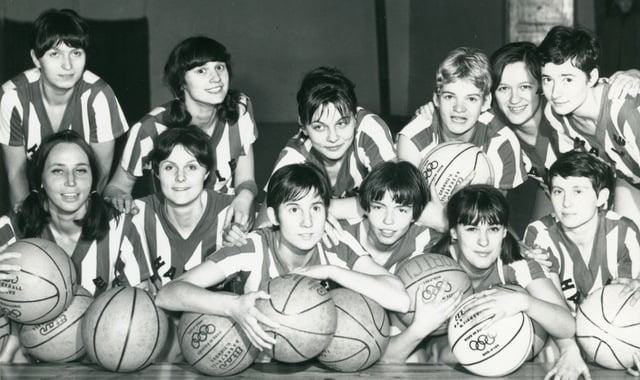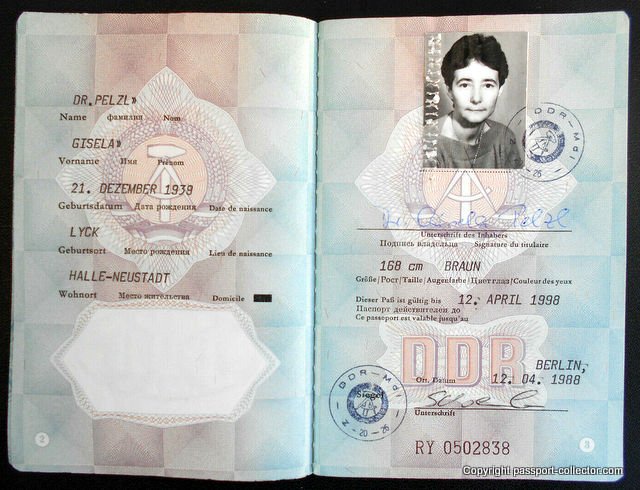Gisela Pelzl – A GDR Sports Physician Passport
Dr. Gisela Pelzl passed away at the age of 80 years
On Friday, March 06, 2020, Gisela Pelzl (born von Mülmann) passed away at the age of 80 after a long illness. Gisela Pelzl earned her spurs as a competitive athlete in basketball, among other things, as part of the women’s national team in the 1960s. She was thus a player at a time when basketball had to develop as a marginal sport in the GDR with increasingly less state support. Even after her rather early retirement from active competitive sports, she remained faithful to the orange leather. In addition to her work as a player in the premier league, her activities from the 1970s onward focused on her work as a sports physician. She provided medical care for entire generations of competitive athletes, often starting in childhood and adolescence. GDR Sports Physician Passport
Actor in a dynamic time
Gisela Pelzl was active in a dynamic time. She was active as a competitive athlete from 1955 to 1968. In the GDR, there was a strong promotion of sports. However, the sport of basketball did not always have an easy time. Basketball did not receive the same attention and support as other team and individual sports. On the one hand, the sport of basketball did not have a particularly strong tradition on German soil. On the other hand, the political leadership had a hard time with the sport with the English name, which was at home with the “class enemy”. The political resentment and financial costs were too great. Thus it was a matter of proving oneself with appropriate successes. Successful female athletes such as Gisela Pelzl contributed significantly to the further establishment of our sport. Despite the withdrawal of basketball as a sponsored sport in 1969. GDR Sports Physician Passport

Gisela Pelzl wrote the team chronicle of the ladies for many years and, like many teams and management players in the post-war years, attached great importance to the creation of meeting and exchange spaces. Getting to know the country and its people, especially during trips abroad, was already important at that time.
Basketball from a different perspective
After her retirement from the women’s national team, “Müli”, as Gisela Pelzl was called by her circle of friends, was active from 1969 as a senior league player with the “HSG PH Halle”. In 1976, together with her team, she once again managed to place on the podium at the GDR Championships (bronze). In the 1980s she kept fit in the district league. GDR Sports Physician Passport
Dr. med. Gisela Pelzl worked for a long time as a physician in the sports medicine service in Halle. After 1969, she was responsible for gymnastics, among other things. However, due to her attachment to basketball, she also cared for numerous basketball players for decades in her full-time and partly also voluntary work as a doctor. This commitment “in another sport” was just tolerated by the management. Whoever played competitive basketball in the 70s and 80s could therefore not get past Dr. med. Gisela Pelzl. GDR Sports Physician Passport
Marion Streit, also a former national player in the younger generation, remembers: “Once a year we went for a sports medical examination. Gisela Pelzl and her staff were responsible for this. She was always very committed and friendly. When problems arose, she always took time for us sportswomen. As a player, she had “bite” and was also ambitious.”
Active senior women after reunification
Gisela Pelzl remained active as a sports physician after 1990. She worked at the Olympic Training Center in Halle until the 2000s. There she continued to care for competitive athletes. Those who took the entrance exam to the sports school made her acquaintance during the entrance test. I myself remember my sports medical examination in 2001. An older lady with short, gray hair smiled at me in a friendly manner. I felt very comfortable then, despite the unfamiliar surroundings with the various medical apparatus. GDR Sports Physician Passport
From the 1990s, “Müli” was increasingly active in senior women’s basketball – success was not long in coming! First playing in the USV Halle in the Oberliga, later in the Stadtliga, numerous participations in the Federal German Senior Women’s Championships followed. In the AK III, even 1st place was reached. After the introduction of AK IV (Ü48), Gisela Pelzl and her team won gold four times and silver again in 2005 at the Federal German Championships. She was also internationally active on the dance floor. As a participant in the FIMBA Championships, Gisela Pelzl represented the FRG in Helsinki in 1999 and in Ljubljana in 2001. In 1997 she also took part in the World Championships in the USA.
The Passport
Her GDR passport was issued in 1988 and valid until 1998. There is a visa for France in 1988 and a US visa from June 1990 issued at the US Embassy in East Berlin. Latter visa is pretty rare as in 1990, after the fall of the wall surely not many US visas were issued. Her visa number is 7279, which means until June 1990 the US Embassy issued this amount of visas. GDR Sports Physician Passport



The original German text, which you can find at https://bvsa.de/der-bvsa-trauert-um-dr.-gisela-pelzl was translated by the author into English.
FAQ Passport History
Passport collection, passport renewal, old passports for sale, vintage passport, emergency passport renewal, same day passport, passport application, pasaporte passeport паспорт 护照 パスポート جواز سفر पासपोर्ट
1. What are the earliest known examples of passports, and how have they evolved?
The word "passport" came up only in the mid 15th Century. Before that, such documents were safe conducts, recommendations or protection letters. On a practical aspect, the earliest passport I have seen was from the mid 16th Century. Read more...
2. Are there any notable historical figures or personalities whose passports are highly sought after by collectors?
Every collector is doing well to define his collection focus, and yes, there are collectors looking for Celebrity passports and travel documents of historical figures like Winston Churchill, Brothers Grimm, Johann Wolfgang von Goethe. Read more...
3. How did passport designs and security features change throughout different periods in history, and what impact did these changes have on forgery prevention?
"Passports" before the 18th Century had a pure functional character. Security features were, in the best case, a watermark and a wax seal. Forgery, back then, was not an issue like it is nowadays. Only from the 1980s on, security features became a thing. A state-of-the-art passport nowadays has dozens of security features - visible and invisible. Some are known only by the security document printer itself. Read more...
4. What are some of the rarest and most valuable historical passports that have ever been sold or auctioned?
Lou Gehrig, Victor Tsoi, Marilyn Monroe, James Joyce, and Albert Einstein when it comes to the most expensive ones. Read more...
5. How do diplomatic passports differ from regular passports, and what makes them significant to collectors?
Such documents were often held by officials in high ranks, like ambassadors, consuls or special envoys. Furthermore, these travel documents are often frequently traveled. Hence, they hold a tapestry of stamps or visas. Partly from unusual places.
6. Can you provide insights into the stories behind specific historical passports that offer unique insights into past travel and migration trends?
A passport tells the story of its bearer and these stories can be everything - surprising, sad, vivid. Isabella Bird and her travels (1831-1904) or Mary Kingsley, a fearless Lady explorer.
7. What role did passports play during significant historical events, such as wartime travel restrictions or international treaties?
During war, a passport could have been a matter of life or death. Especially, when we are looking into WWII and the Holocaust. And yes, during that time, passports and similar documents were often forged to escape and save lives. Example...
8. How has the emergence of digital passports and biometric identification impacted the world of passport collecting?
Current modern passports having now often a sparkling, flashy design. This has mainly two reasons. 1. Improved security and 2. Displaying a countries' heritage, icons, and important figures or achievements. I can fully understand that those modern documents are wanted, especially by younger collectors.
9. Are there any specialized collections of passports, such as those from a specific country, era, or distinguished individuals?
Yes, the University of Western Sidney Library has e.g. a passport collection of the former prime minister Hon Edward Gough Whitlam and his wife Margaret. They are all diplomatic passports and I had the pleasure to apprise them. I hold e.g. a collection of almost all types of the German Empire passports (only 2 types are still missing). Also, my East German passport collection is quite extensive with pretty rare passport types.
10. Where can passport collectors find reliable resources and reputable sellers to expand their collection and learn more about passport history?
A good start is eBay, Delcampe, flea markets, garage or estate sales. The more significant travel documents you probably find at the classic auction houses. Sometimes I also offer documents from my archive/collection. See offers... As you are already here, you surely found a great source on the topic 😉
Other great sources are: Scottish Passports, The Nansen passport, The secret lives of diplomatic couriers
11. Is vintage passport collecting legal? What are the regulations and considerations collectors should know when acquiring historical passports?
First, it's important to stress that each country has its own laws when it comes to passports. Collecting old vintage passports for historical or educational reasons is safe and legal, or at least tolerated. More details on the legal aspects are here...
Does this article spark your curiosity about passport collecting and the history of passports? With this valuable information, you have a good basis to start your own passport collection.
Question? Contact me...

